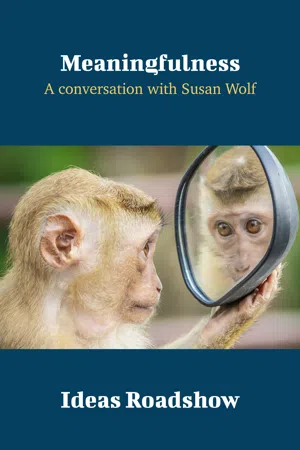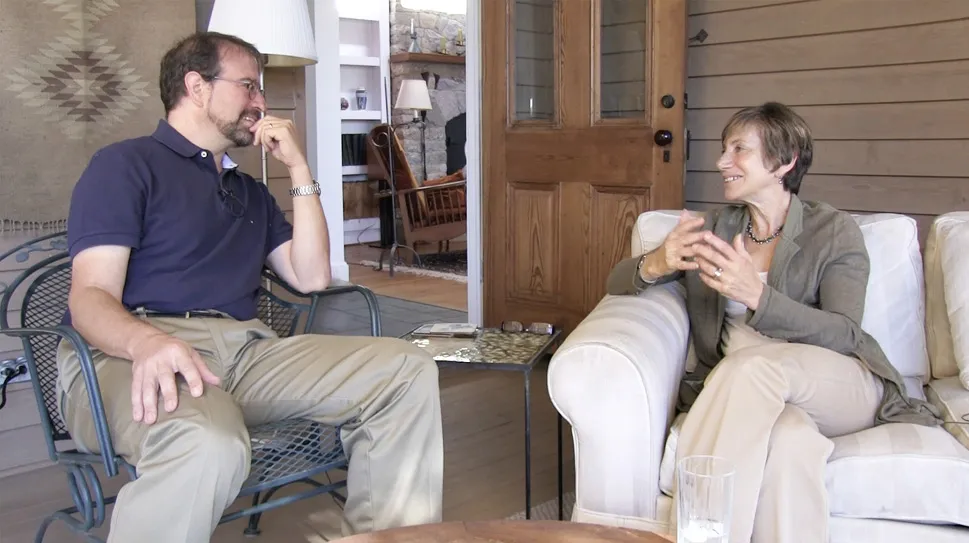![]()
The Conversation
![]()
I. Philosophical Engagement
The appeal of thinking deeply
HB: My understanding is that you did an undergraduate degree in both mathematics and philosophy. How did that come about?
SW: I started in math. Like most people in America, I don’t think I knew what philosophy was when I was in high school. I loved math, and I loved logic in particular. So I went into college thinking I’d be a logician, I guess.
HB: Oh, really?
SW: Well, I wasn’t sure what I would become, but logic was what I loved.
HB: But you knew about logic in high school? Most people aren’t exposed to logic in high school either.
SW: That’s true. When I was in high school, I was a very non-athletic, nerdy kid; and my parents, at great financial sacrifice, saved to send me to one of those boarding summer schools. A sort of summer camp for—
HB: Non-athletic people.
SW: Yes. It was called Mt. Hermon Summer School, and we would have courses for three hours every morning for the whole summer. And just by chance there was this fantastic teacher, a math professor from Hampshire College who was teaching mathematical logic for the summer. The course went all the way through to Gödel’s Incompleteness Theorems. It was a very intense thing for high school students, and it was the best thing I had ever encountered. That’s when I fell in love with logic.
HB: It’s easy to understand how from there you went into philosophy. There’s a direct link right there, through mathematical logic.
SW: Yes. When it comes to logic, sometimes mathematics departments would own it and some philosophy departments would own it. There’s a real overlap there.
My undergraduate advisor at Yale was a very philosophical logician who had started a special math and philosophy program. I might have been the first person to actually take advantage of it.
After logic, my second favourite classes were English classes: I loved logic and novels, basically. One short way of explaining why I went into philosophy was because it was a subject in which you could do both those things and count them towards your major.
Abstracting a little bit more, I think it was that I loved the aesthetics of math—of system-building, and the kind of clarity you could get—together with the mind-expanding feeling you got when you learned these new concepts. But I love human beings too. I mean, I love thinking about human stories and the human condition. So philosophy was a way in which you could have the subject matter of the humanities in a more formal context. In retrospect I think that was a good choice.
HB: Did you find yourself, as time went on, deliberately moving more towards the human-centred aspects and away from the abstract and impersonal nature of mathematics?
SW: Well, while I was still in college I just loved both those things. So I went into graduate school still expecting to do logic as my topic. But because I had been a math and philosophy major, I’d had more math than philosophy—that was the way that the major was structured—and when I got to graduate school I thought that before I go into what I’m planning to specialize in, I should get a broader background in philosophy.
And then I just got distracted. I mean, I just thought I was taking courses in different subjects—there are always distribution requirements. When I was in grad school Thomas Nagel was teaching at Princeton, and also Richard Rorty. Between them I just found myself interested in other things, so I didn’t go back to logic.
HB: Thomas Nagel was your PhD thesis supervisor, right?
SW: Yes.
HB: What made you choose Princeton in the first place?
SW: Well, I wanted a really good graduate program, and Princeton and Harvard were probably the best two at the time. Or at least that’s what I was told. So I looked at both of them. They both would have been good for the things I was interested in.
In fact, I’m not sure that I even knew who Thomas Nagel was at the time. But they also had David Lewis, and Saul Kripke was teaching courses there too, though he wasn’t fully on the faculty. It was a very good place for what I thought I was going to do.
HB: As far as your work on free will and responsibility, how did that come about? What made you start moving along those lines?
SW: As I remember it, that started as a result of taking one of Nagel’s seminars where we read some stuff on free will. I think it was in that class that I found out that it was all right to still be deeply puzzled by the subject.
I don’t think I studied it as an undergraduate, but I must have gotten some sense that people didn’t think about those questions anymore: they had all been settled and all respectable people in philosophy were compatibilists about free will—they didn’t worry about determinism sapping us of freedom and responsibility, they thought such worries were confused and had been dealt with, or at any rate you couldn’t talk about that as something that you still didn’t know the answer to.
But Nagel had this wonderful way of not knowing the answers. He loved questions that were really hard and that he didn’t know the answers to. Yet here was this totally brilliant person. So the discovery that I could actually ask that question, and it would not be a sign of muddle-headedness or softness, was just fantastic.
So my recollection is that my interest in free will was piqued through taking his course. But my husband, who is also a philosopher, and whom I met when I was an undergraduate, said that I was interested in free will even then. But I don’t remember that.
HB: Well, those two things aren’t incompatible obviously, right? You certainly could have been intrigued by it as an undergraduate and then had your interests piqued further in graduate school.
SW: Yes, right.
HB: I’d like to talk a little about your style. I don’t pretend to have read everything you’ve written, but I’ve read some, and there seems to be some interesting aspects of your style that consistently come through. Let me describe what I mean, and you can tell me if any of that makes sense, and, if so, is deliberate on your part.
I’m thinking specifically of not only Meaning in Life and Why It Matters, but also your work on moral saints and other things. There’s an immediacy to your writing, an evident lack of pretentiousness, that comes directly across to the reader. One gets a sense of being engaged in philosophically substantive topics, while at the same time appreciating that this is far more than an academic exercise. You concern yourself with matters of the human condition that the person who’s working at the drugstore down the road has wrestled with, and is wrestling with.
Is that the sort of effect that you deliberately try to create? Well, before I ask that I suppose I should ask if you agree with that assessment.
SW: Well, I take it as a compliment.
HB: It’s meant as a...

